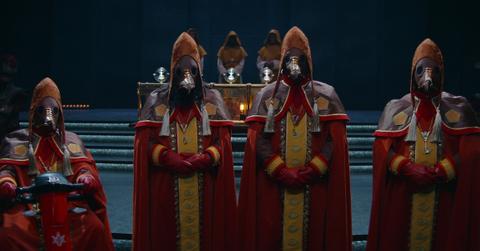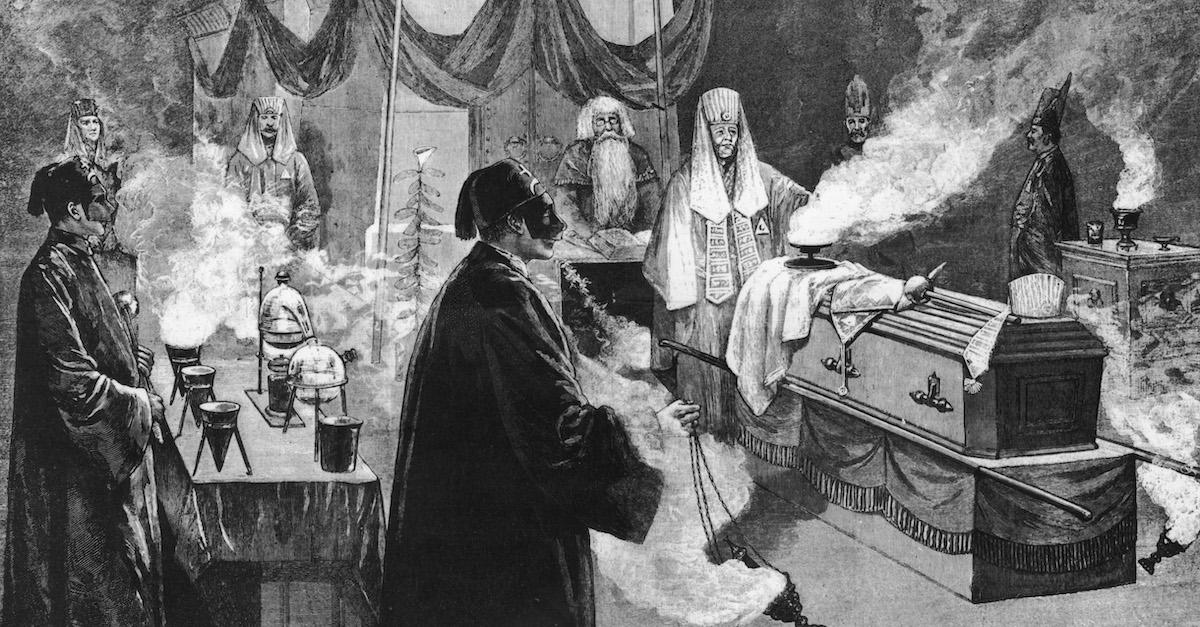Is Mike Myers' Upcoming Series, 'The Pentaverate,' About the Illuminati?
Published March 17 2022, 3:17 p.m. ET

None of us thought that the wildest thing to happen in 2022 would be on television, but with real life becoming more ludicrous by the day, television has the opportunity to leap even further into the absurd. And who better to bring ridiculousness to your screen than comedian Mike Myers, the creator of and star behind Netflix's new series, The Pentaverate?
The Pentaverate is about a secret society formed in the 1300s that continues to rule the world and pull strings behind the scenes. But while the series is clearly a comedy that showcases Mike Myers’ talent of taking on many different personas, many fans are wondering if The Pentaverate is actually about the Illuminati. Here's what you need to know ahead of the show's release.

Is ‘The Pentaverate’ about the Illuminati?
The logline of The Pentaverate reads, “What if a secret society of five men has been working to influence world events for the greater good since the Black Plague of 1347?” Well, that sounds a lot like a supposed society that many people happen to already believe in: the Illuminati.
The conspiracy theory behind the Illuminati posits that a small group of people have secretly been pulling the strings behind every major world event, from COVID-19 and major political events, to other world-changing incidents.

In the trailer for The Pentaverate, we learn that the five people who created the Pentarverate learned that the Black Plague was started by rats, not by God. In reality, scientific discoveries influenced a pro-science movement called the Enlightenment, which evolved out of other “enlightened” movements that toyed with variations on religion. The term “illuminati” has been traced back as far as the gnostic era and derived its meaning from “light,” according to Encyclopedia Britannica. So it’s not such a far-fetched idea that a group like Netflix's fictional Pentaverate society formed after the Black Plague.
In fact, the Illuminati we think of today is based on a group called “the Bavarian Illuminati” from 1776.
While the Black Plague led to the Enlightenment and there were earlier uses of the word “illuminati” to describe movements of new-age teachings, no group resembled what we think of today as the Illuminati until 1776.
The Bavarian Illuminati only lasted for 10 years, and its members actually called themselves “Perfectibilists,” a name even more ridiculous than the Pentaverate. Their aim was to replace Christianity with a “religion of reason,” which sounds a lot like what the Pentaverate aims to do in the new series.

In order to avoid identification, members of the original Illuminati had codenames; its founder, Adam Weishaupt, was called Brother Spartacus. There were also a hierarchy within the organization: the Novices, Minervals, and Illuminated Minervals.
However, many people today conflate the Illuminati with Freemasonry, which is a known, real secret society, because the Bavarian Illuminati used Freemason lodges as recruiting grounds. However, the Illuminati themselves only grew up to around 2,000 members before they disbanded.
Conspiracy theories in popular culture posit that despite being disbanded, and despite their beliefs being made illegal, high-ranking members of the Illuminati continued their mission of infiltrating and overthrowing institutions like religion, government, monarchy, and society. That’s why people today think that Queen Elizabeth II and President Joe Biden are part of the supposed society.
From what we can glean about the Netflix series so far, The Pentaverate bears a lot of similarities to the modern-day idea of the Illuminati, as well as to the history behind it. Finishing off the trailer with a triangular symbol and the eye is also the perfect nod to the Illuminati. It’s clear that the Illuminati is the inspiration behind The Pentaverate, but the new series is definitely a more humorous satire of the secret society's history.
The Pentaverate drops on Netflix on May 5.